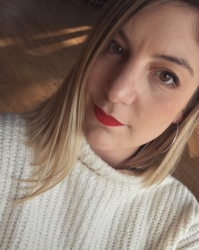
One of the Boys
I started learning Karate when I was about 11 years old. Little did I realize that my martial arts journey would impact my understanding of being a woman. I wanted to do what my brothers did. It was important to me to hold my own amongst the boys and I wanted to prove myself. My brothers quit a few years later, focusing instead on hockey, but I never gave up on martial arts. I transitioned from Karate to Muay Thai in the hopes of learning a more full-contact and practical art. After a while, I took up Brazilian Jiu Jitsu to add grappling to my skillset. I fell in love with it. It eventually became my focus. A purple belt in BJJ now complements my black belt in Karate.

I have often found myself in what many would consider male-dominated environments. Besides the fact that my martial arts training continued, I was a hockey player in high school, and in my 20s I worked security in bars and nightclubs.
I always saw it as a challenge, as a way to prove that I could show no weakness. I wanted to be mentally tough and to handle whatever was thrown at me. If what was thrown at me was a physical challenge, I wanted to prove that women can handle this as aptly as men do. If it was sexism and harassment, I wanted to prove that I could let it roll off my back and dish insults right back. I thought I was proving myself to everyone around me. What I didn’t realize was that I was after something very different: proving myself to me.
What I Learned About Being a Woman
My martial arts journey has taught me a lot about being a woman. I grew up thinking it was teaching me to appreciate how much like a man I could be. What it actually taught me was how to embrace my womanhood and how to be proud of it.
Firstly, martial arts taught me to appreciate and celebrate my body for what it can do for me as opposed to what it looks like. I learned body awareness, strength, agility and a respect and gratitude for how my body performs. As women, we are socialized from a young age to mind our appearance. We are bombarded with images of “perfect” bodies and constantly told of new body parts to be ashamed of should they not have the “ideal” look.
I started moving away from seeing myself as an object, as material, and started experiencing my body as a powerful machine that keeps me strong, protects me and allows me to experience the world. This was an extremely empowering change.
Secondly, martial arts allowed me to meet women with similar mindsets, women who wanted to celebrate their strength and aptitude, women who set goals and smashed them. Martial arts altered my view of female friendships. I used to be the girl for whom the best compliment was “you’re not like other girls.” I was young and immature and somehow thought that pitting myself against other women was the way to be special.
Reframing What it Means to Be Female
Why do so many of us feel like we have to be less like other women to be special? We have to have more “masculine” traits to be strong, like being a woman is somehow old hat, uninspiring or makes us weak. Martial arts allowed me to see that being a woman is multi-faceted. My training allows me to understand that my strength lies not in diminishing what makes me feminine. It actually is about allowing for those things to coexist with strength, capability, competitiveness, etc. These traits are not exclusively male.
I was recently asked what I do to prepare for a tournament. The first thing that came to my mind is the fact that the night before I compete, I paint my nails. Usually hot pink. I do this partially because it’s fun. It’s a simple thing I can do to pamper myself, but it also allows me to be intentional in how I present myself. I have feminine traits and I enjoy putting them on display. There is no need to counter these things to be skilled. I do not need to fancy myself “one of the guys” to be strong.
Embracing Our Identity as Women
I’ve learned to embrace the fact that being a woman means many things but most of all, it means doing as I damn well please. It means I can exist in whatever way makes me feel most authentic. I do not have to suppress every “feminine” impulse I have to prove I am worthy. Nor do I have to avoid coming across as “masculine” to prove I am womanly enough.
As a teenager I was learning to contend with the boys and trying to become one of them. As an adult I learned that being female often made men view me differently. I struggled between fighting that and using it to my advantage. In the end, my martial arts training has taught me that being just who I am is enough. In fact, it’s powerful.
- Managing Nerves for Competition - August 16, 2021
- Being a Woman: What Martial Arts Has Taught Me - July 8, 2021
- Brazilian Jiu Jitsu: My Best Tool as a Bouncer - June 7, 2021

Leave a Reply